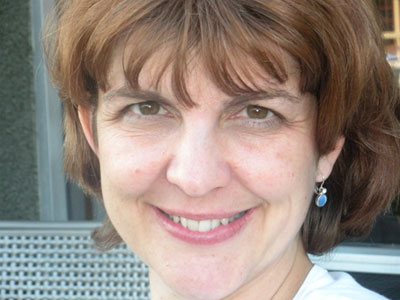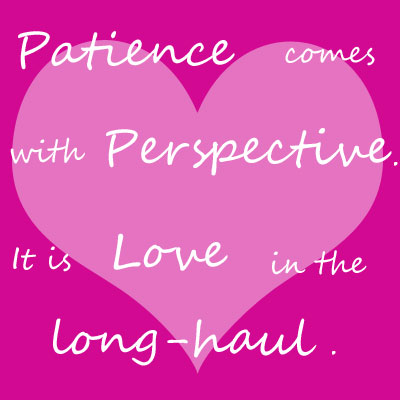EDITOR’S NOTE: …Renée told me, “I first contemplated long-haul love when my first daughter was a toddler. Our first three children are grown and married with children of their own, and our two youngest children now are teenagers. My husband and I are reaping the rewards of grandchildren and facing the storms of guiding two teens into adulthood.” I hope you enjoy her article!
It was going to be a short night as it was, so I felt like crying the second time the three-year-old tried to crawl in bed with us. The baby had been up earlier, too. How does the saying go? “Lord, give me patience, and give it to me now!”
I remember my mother used to tease that she prayed for patience and God sent her my little brother—a child with endless curiosity and energy and little need for sleep. So I don’t ask for patience. I know it isn’t given—it’s earned.
Instant patience is a contradiction—and an impossibility. Because patience is not a fast-acting pill to pop when situations get tight and my temper stretches thin. It’s more than just not yelling at the kids.
What is patience? Where does it come from? And what does patience have to do with love?
Patience comes with perspective. It is love committed to the long-haul.
I am one of those perhaps strange and rare women who would keep having children simply to experience the thrill of childbirth. Those hours of physical pain and emotional intimacy as my husband and I push and coax a new person into the world are rewarded by euphoric delight as I meet my new child. She seems to gaze at me with recognition, and then nuzzles eagerly at my breast. I relish those quiet moments when everyone has gone home and I am left alone to curl up around my new baby.
I love children. Between birthing four, fostering two and adopting one—I’ve had a houseful of them. They are a gift, a reward, a joy, a bouquet of blessings.
For just as after every wedding comes a marriage, so after every birth comes a life. A life that came forth from the love and union of two people—a life that will continue to demand everything from them. Drawing at least l8 years from our time and energy. Drawing a lifetime from our hearts.
Then how can I rave about parenthood to that young couple knowing…the sleepless nights that will leave them ragged…the isolation from a winter’s worth of colds and ear infections…the constant struggle to control not just the two-year-old’s temper but their own unanticipated anger? What about the ten-year-olds sullenness and the teenager’s withdrawal? How do I keep parenting when I know I’ve blown it so many times?
Because of long-haul love. Love that is not patiently passive, but love that is as patient as God is—willing to wait for the rewards of love. Rewards even beyond those first steps, first words, sloppy kisses and angelic sleeping faces. |
My little boy wraps his small arms around my neck, looks intently into my eyes, and declares, “I love YOU, Mommy,” with the emphasis on the YOU. My heart is rewarded. Perhaps I am doing something right after all. Yet what I really want is to hear those words from a young man with whom I have developed a real relationship.
Fast forward twenty years and my son still says, “I love you.” He also tells me he wants to let me into his life—his hurts, heart, his story. I realize I have not parented perfectly, but I am experiencing the reward of long-haul love. And I look forward to hearing them from a middle-aged man who himself has walked the privileged road of parenthood. Pictures of tomorrow’s hopes give me strength to choose love today.
When I manage to discipline my children calmly, it’s not because I’ve counted to 10 first, but because I’m doing it with one eye down the road 10 and 20 years. I’m committed to seeing them through. Any particular situation isn’t the end of the line, it’s only one in thousands. That’s why love is patient. It’s not a Band-Aid but a commitment.
That’s why I continue to say, “Go for it! It’s worth it!” to hesitant young couples and “you’ll make it!” to weary parents of newborn. So much lies ahead for these little ones.
I remember tucking my oldest daughter into bed and realizing, “Elizabeth isn’t a little girl anymore. She’s already halfway to driving and dating. She stays awake nearly as late as I do at night and is blossoming into a young lady before my eyes.”
I snuggled beside her in bed for a minute, more conscious than ever that her legs stretched almost as far toward the end of the bed as mine did! We laughed about her baby days and joked about whom she might marry when she grows up tomorrow. Neither of us knew that, just a few years around the corner, she would find me aggravating and set off on her adult life ready and able—but coolly distant for several years.
Last week I returned from a week visiting Elizabeth and her husband and children. I soaked up mom and daughter talking time. I immersed myself in hugs and kisses and snuggles from her children—and watched her parent with love and patience.
Yes, Love will still be around when it’s finally happened. When sleepless nights are but a vague memory. When the four-year-old is finally potty trained. When the stacking cups and big wheels are replaced by basketballs and scooters and 10-speed bikes. When the opportunities and choices in raising a toddler become the challenge and adventures of guiding a teen. When my children are parenting their own children.
At every stage, I will pray, “Lord, give me love for the long-haul.”
 About Renée Sanford About Renée SanfordRenée has been married to her high school sweetheart, David, for 30 years. They are the parents of three grown and married children and two teens and blessed with six grandkids. Renée has a passion for encouraging mothers at every stage—in an article, at a conference, or over a cup of coffee or tea. Renée is the co-author (with David) of How to Read Your Bible and the notes for the Living Faith Bible. |


 Hi, I'm Betty and welcome to Home Educator Mom. Whether you are a homeschooling family or not, we’re all called to be our kids’ first teachers. Our desire here is to encourage moms as we walk this path of training and equipping our children. We hope you will stay a while and join us on this journey: learning and sharing life together. Meet our
Hi, I'm Betty and welcome to Home Educator Mom. Whether you are a homeschooling family or not, we’re all called to be our kids’ first teachers. Our desire here is to encourage moms as we walk this path of training and equipping our children. We hope you will stay a while and join us on this journey: learning and sharing life together. Meet our 










Thank you Renee Sanford. Your article hit home last night when I had a sick child with the stomach flu.
The long-haul love that you beautifully describe not only is the safe, forever-and-always secure growing space for our kids, it also is the kind of love that changes us moms slowly over the years, gradually shedding the self-absorbtion, “me time” expectation, and in its place builds beginning glimpses of what God communicates when He tells us “I love you”. Maybe all the practice in learning to love well is rewarded with grandchildren? Happy Valentines Day!